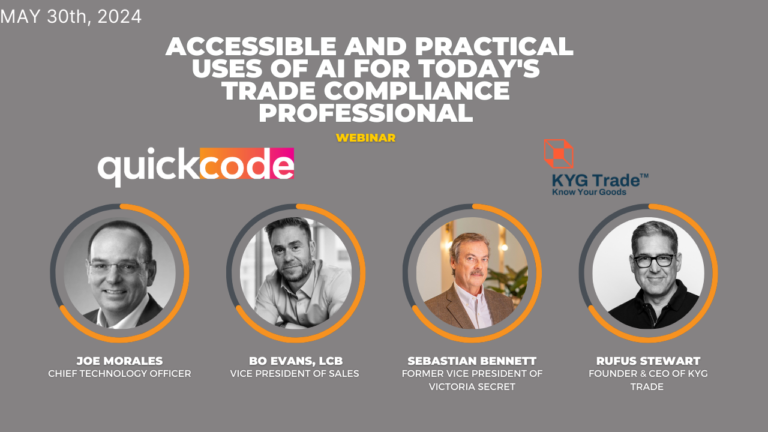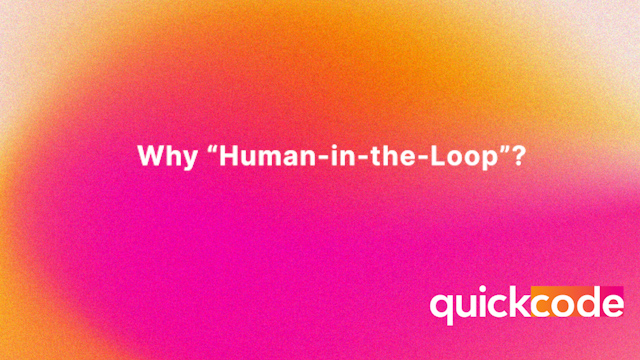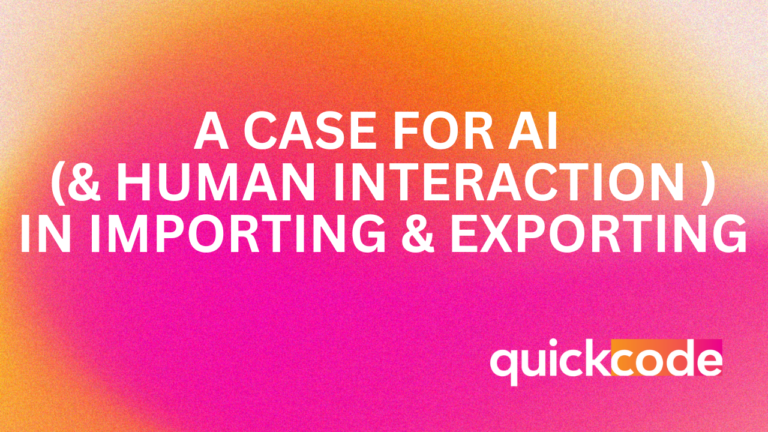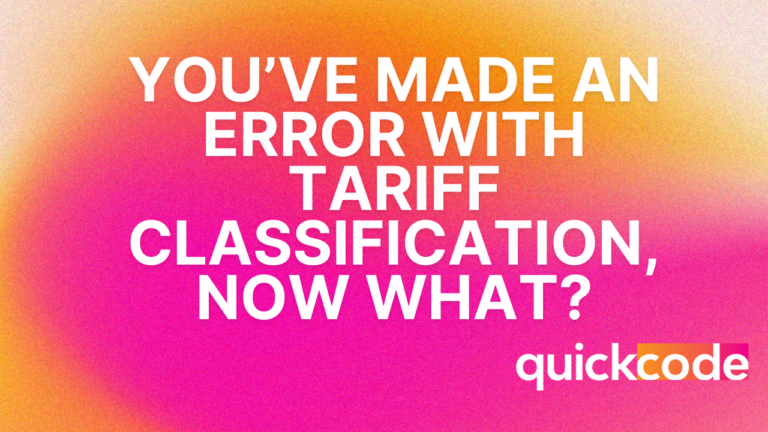Introducing Quickcode: Revolutionizing HS Classification with AI
HS classification plays a vital role in international trade, affecting importers, exporters, customs brokers, freight forwarders, trade attorneys, and compliance professionals. Getting it right is crucial, ensuring the correct tariff codes, accurate tax payments, and compliance with regulations. Yet, we all know that HS classification can be a complex and intricate process. So, what about HS classification with AI?
Imagine a scenario where classifying an elephant requires meticulous expertise and knowledge. With Quickcode, we’re here to redefine the way you approach HS classification. Our AI-powered solution simplifies the process, providing you with fast and accurate results that save you valuable time and minimize errors.
Join us as we address the burning question: Are the robots coming for your job? Joe will guide you through the evolution of AI and its various applications in HS classification. From the expert systems of the past to the machine learning advancements of the 2000s and 2010s, and finally, the mind-boggling potential of generative AI in the 2020s, Joe will shed light on the possibilities and limitations of each approach.
With captivating anecdotes and real-world examples, Joe will demonstrate why expert systems are not a threat to your expertise. He will unveil the power of machine learning, particularly for those with extensive historical data, showing how it complements and enhances your classification efforts. Finally, he’ll unravel the enigma of generative AI, revealing its awe-inspiring ability to mimic human-like responses and its inherent limitations.
At Quickcode, we believe in empowering professionals like you. Our AI-driven platform combines the best of human expertise and cutting-edge technology to revolutionize HS classification. By leveraging the power of AI, we enable you to streamline your processes, make informed decisions, and stay ahead in the ever-changing landscape of international trade.
Don’t miss out on this captivating video presentation. Gain valuable insights, explore the possibilities, and discover the exciting future that awaits you with Quickcode. Whether you’re an industry expert, a seasoned professional, or someone new to HS classification, this video will leave you inspired and armed with the knowledge to navigate the evolving world of HS classification with AI.
Join us now and unlock a world of efficiency, accuracy, and peace of mind. Quickcode awaits you—start your journey today!
Video Transcript:
Timestamps
0:00 Introduction
1:13 Are the Robots Coming for my Job?
3:35 AI in the 80s and 90s – Expert Systems for HS Classification
5:28 AI in the 00s and 10s – Machine Learning for HS Classification
7:06 AI in the 2020s – Generative AI
Introduction
Hey everybody, thanks for joining us today. I am Shannon Hynds, the CEO of Quickcode, and with me today is our presenter, Joe Morales. I can tell that this is a problem that really resonates with a great number of you because we’ve had a tremendous response to the webinar, so thank you. Before we get started a few items of housekeeping. First of all, if you have a question there’s a Q&A button at the bottom. Please drop them in there. Our engineer, Ross, will be managing those and passing them along to Joe at the end of the webinar and also we will be sending out a video link to this presentation later today. So, if you have to leave early or if you want just a copy, we’ll be sending it out to everyone who registered. So with that, I will introduce Joe. Joe is the CTO of Quickcode. He’s been the CTO of Quickcode for about two years. He has the distinction of being both, a data scientist, as well as a computer engineer. He has many years in the field and I think you’ll find him both educational and entertaining! So, with that, Joe I’ll turn it over to you!
Are the Robots Coming for my Job?
Thanks Shannon, and welcome everybody. You’re here presumably because you have some interest in HS classification. Either you’re an importer, or an exporter, a custom broker, freight forwarder, trade attorney, compliance professional, whatever. You’re interested in HS classification and that’s why you’re here. And why do you care about HS classification? Because you got to get the right tariff code. Because you got to pay the right taxes. You got to stay out of trouble with CBP. And as we all know, HS classification is pretty tricky.
For instance, this elephant on the left – He’s a live animal mammal other, other. The elephant on the right, not the same. He’s a traveling circus and traveling Menagerie. But how do you know that? You know that because you’re a professional. Because you’ve been trained to do this. And when you go to classify that elephant on the right, you start as a live animal but you remember that you’re supposed to go to the notes and you check the notes and it says this chapter covers all live animals except animals of heading 9508. Well, what does that mean? You go there and you find that that’s a circus or traveling with Menagerie and you’re like wait, is this elephant really a circus? No, but then you go to the chapter 95 notes and it says that this heading chapter also covers auxiliary equipment, including animals. And you know all this because you’re an expert. You’ve been trained to do it. You’ve been doing it for a long time and the reason you’re here today is because you want to know; are the robots coming for my job?
I can tell you right now, I can give the spoiler. The answer is Definitely Maybe. Back in late, last year December, ChatGPT came out and took the world by storm. It was in all the newspapers, everybody was talking about it. This is an article from The New York Times about ChatGPT. What is ChatGPT? What was a chatbot but it was a chatbot that is so realistic, so is able to appear to be a human that it was phenomenal, and everybody’s just really excited about it. If you want to know whether or not AI is going to take your job, let’s first talk about what do we mean by AI? What does it mean?
AI in the 80s and 90s – Expert Systems for HS Classification
Back in the 80s and the 90s when we talked about AI, we really talk about expert systems. Expert systems are very predictable. They’re understandable, because they’re trained by experts. What you do is, you get a really smart guy, like Dr. Einstein there. He writes a bunch of rules about whatever problem it is you’re trying to solve. Those rules go in an inference engine and then a regular user can just create the inference engine and really get the expertise of the expert who trained it. So it is artificial intelligence in the sense that you know, it is the computer that’s – that’s coming up with the answers, but it was trained by an expert. These things are still around. They’re still relevant. I worked on one as recently as 2020. You may remember 2020, that was the start of the Covid pandemic. But long before they developed any covid tests, I was part of a team that was asked to figure out, hey how can we tell if somebody has Covid? And we started with an expert system for a couple reasons. Number one, we didn’t have any data to do anything different. All we had was rules. And number two, we were working with doctors, and doctors like expert systems because well, they’re the experts. And expert systems are understandable and so the doctors were able to come up with rules that we were able to apply to kind of decide, does this patient likely have Covid or not?
What about expert systems for HS Classification? Well I’ve talked to people who’ve done these before and these work well in certain circumstances. If you’re a specialized importer that like say auto parts or electronics, you work on a defined subset of the schedule, you’ve got customs classification experts who can write rules for you. You can build a very nice rule engine. I’ve talked to people who have done it. You know the guy I talked to, he’s like you know it worked really great, but it was a big kind of a maintenance chore. You know the things that we’re importing changed. The schedule changed. It ultimately fell out of use, but these can work well. But what I am here to tell you, is that expert systems are NOT coming for your job. Because they still require an expert.
AI in the 2000s and 2010s – Machine Learning for HS Classification
Okay, in the aughts and the teens, our concept of AI kind of changed from expert systems to machine learning. Machine learning is less predictable and understandable than expert systems, because it really makes up its own rules. But it’s trained by this machine iterating over labeled data. Well what do I mean by labeled data? Here’s a great example of labeled data. Here, is this a picture of a chihuahua or a blueberry muffin? Some of them are chihuahuas; some are blueberry muffins. So, a machine iterates over these labeled data, it forms its own rules and then it’s able to take those rules and kind of extend it to things that we haven’t seen before. Machine learning for HS classification is being used. It works well. I went to a seminar with a company that developed it and here’s where it works. It works when you have a lot of data to feed it because that’s what it has to be trained on. Labeled data. So, if you’re a large importer/exporter who has a lot of historical data, has a lot of different types of of data in there, including the HS codes that those things were classified under, what you can train machine learning to do, is to find existing commodities that are like the the new commodities that you’re trying to import. And so you’re not really training machine learning to do classification, you’re training the machine learning to find which, what product that you already imported does this product look like? And then that’s how it can do classification, because you’ve already done it before. So, it’s really built on the work of the classification experts that already did it. And so, machine learning is not really coming for your job either.
AI in the 2020s – Generative AI
Moving on, now we’re up to the 20s. When we talk about AI in the 20s, what do we mean? Well, especially recently what we really mean is generative AI, because it has revolutionized AI. Generative AI is completely unpredictable and inscrutable compared to the other forms I already talked about, because it trains itself. It’s really phenomenal. You know, it’s across all the spectrum. It can create art. It can create music. And what we’re interested in, is it can create text. So you know, I went out to ChatGPT, which I already talked about, and said hey give me a limerick about Generative AI and here it is.
There was a gen AI so slick,
it could mimic and talk without a hic,
its responses so real, (and that’s the thing, I mean this thing is really real, as if it were a human)
it’s flaws hard to feel,
Yet sometimes, the answers were a trick.
And that’s the real takeaway from this, the answers are a trick. Because one of the things about these generative AIs is, they will make things up. And the actual, technical term for it is, hallucinate. These things will hallucinate. They will make things up and tell them to you very convincingly, as if they’re real. So, you don’t have to take it with just a grain of salt, what you get from generative AI. You have to take it with an entire shaker of salt.
Learn More:







